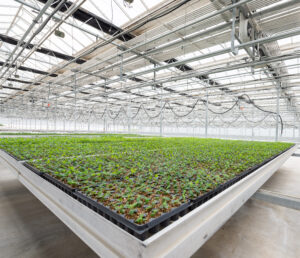Commerce funds four more innovative projects seeking to repurpose industrial and agricultural waste
Industrial Symbiosis grants advance the idea that growth does not have to equal waste; one company’s waste is another’s resource
OLYMPIA, WA – The Washington State Department of Commerce today announced $850,000 in grants to four projects that support efforts to develop beneficial uses for industrial waste. In this second year of the Industrial Symbiosis Program, funded projects range from research and development to implementation. The program seeks to go beyond waste reduction by turning waste into a valued resource, which benefits the producer and stimulates new business opportunities and profitability that support the “circular economy” – one that is sustainable, integrated, climate-friendly and profitable.
Competitive grants announced today are:
- Cascadia Produce (Auburn) – $250,000 to establish a retail rejection hub and distribution center for rescued food, and develop an online marketplace to serve as a market outlet to an expanded number of organizations with direct access to rescued food. Additionally, they will explore whether delivery of case quantities of rescued product can be implemented in a cost-effective, self-sustaining way to support ongoing logistics. Project partners will include Cedar Grove and Seattle Good Business Network.
- Qualterra (Cheney) – $206,857 to turn downstream material from Washington industries into a useful biochar product
to bolster crop and soil health. The study aims to further cultivate symbiotic relationships with industries aiming to recycle biomass waste streams, as well as with growers and farmers seeking to produce crops in a profitable and environmentally sustainable way. Additionally, the pyrolysis of these industrial waste streams will serve as the basis for generating renewable energy utilized to power the greenhouse where the biochar trials are conducted.
- Waste Loop (Leavenworth) – $157,326 to further develop the Wenatchee Valley Reuse Innovation Center (RIC), a facility dedicated to promoting and facilitating the reuse of materials from construction and agricultural industries. The primary goal is to promote a circular economy by diverting waste from landfills while encouraging the repurposing or refurbishment of materials into beneficial reuse through direct resale or value-added production.
- Washington State University (Pullman) – $235,817 to manufacture biochar from waste biomass such as forestry residues and municipal biosolids, and incorporate it into concrete to develop durable, carbon-negative alternative for the construction sector. Diverting waste biomass to beneficial use (biochar as building materials) in concrete aims to stimulate the local economy and create jobs while mitigating climate change.
“Industrial symbiosis is one tool from a set of forward-looking ideas and applications demonstrating that growth does not have to equal waste,” said Commerce Director Mike Fong. “Innovation is happening around the world to advance this idea, and we are supporting opportunities to accelerate it here, creating profitable business models and good jobs that protect the environment and strengthen our communities.”
“This year, Commerce received a wide range of exciting proposals, again highlighting the magnitude of industry-driven involvement in helping to achieve the state’s decarbonization goals,” said Kirk Esmond, Commerce Sustainable Business Development Director. “These beneficial projects showcase how underutilized resources of one company—such as waste, byproducts and materials—can be converted to energy or added-value products. “
“We are honored to again be involved with the Industrial Symbiosis Program,” said Mike Werner, Chief Executive Officer, Qualterra Inc. “This award will further accelerate the study of biomass processing to produce biochar, using various agricultural waste streams, for the purpose soil regeneration, crop health/yield improvements and carbon sequestration, as well as the generation of renewable energy which is pivotal to climate health.”
The program looks across the state to fund expansion of existing industrial symbiosis efforts, assist others that are on their way, and support those still on the drawing board. More information is available on Commerce’s Industrial Symbiosis website.

